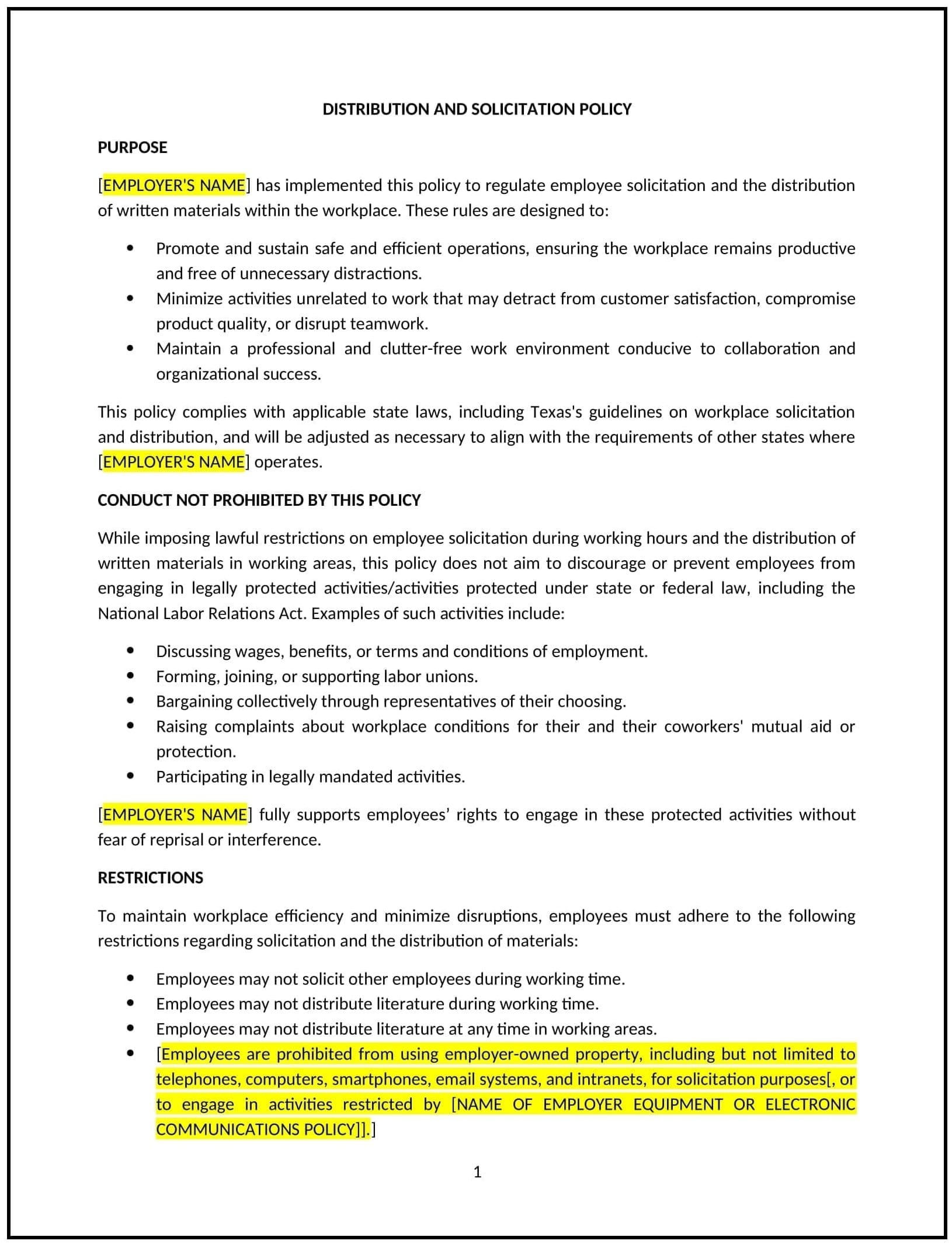Distribution and solicitation policy (Texas): Free template
Got contracts to review? While you're here for policies, let Cobrief make contract review effortless—start your free review now.

Customize this template for free
Distribution and solicitation policy (Texas)
This distribution and solicitation policy is designed to help Texas businesses establish clear guidelines for managing the distribution of materials and solicitation activities within the workplace. Whether businesses are addressing requests for charitable donations, advertising, or the sale of goods, this template provides a structured approach to managing solicitation and distribution in a way that ensures fairness and minimizes disruptions.
By adopting this template, businesses can maintain a positive, productive work environment while managing outside interests and improving compliance with legal requirements.
How to use this distribution and solicitation policy (Texas)
- Define allowable activities: Specify the types of distribution and solicitation activities that are permitted within the workplace, including charitable solicitations, sales of goods, or employee petitions.
- Set location and time restrictions: Outline where and when solicitation activities are allowed, such as designated areas or certain times during breaks, to minimize disruption to business operations.
- Address approval processes: Detail the procedures for obtaining approval before engaging in solicitation or distribution, including who must be contacted (e.g., HR or management) and what documentation or information must be submitted.
- Specify employee participation: Clarify whether employees are required or encouraged to participate in any solicitation activities and whether they are allowed to solicit fellow employees during work hours or breaks.
- Establish prohibited activities: List activities that are not permitted in the workplace, such as solicitation for personal gain, disruptive conduct, or activities that violate company values or legal regulations.
Benefits of using this distribution and solicitation policy (Texas)
This policy offers several benefits for Texas businesses:
- Maintains a productive work environment: A clear policy helps businesses prevent disruptive activities, ensuring that employees can focus on their work without unnecessary interruptions.
- Ensures fairness: By setting clear rules for solicitation and distribution, businesses ensure that all employees have equal access to participate in activities without favoritism or bias.
- Reduces legal risks: A well-defined policy helps businesses comply with Texas state laws and federal regulations, such as those related to workplace rights and solicitation, reducing the risk of legal disputes.
- Promotes employee rights: The policy allows employees to engage in certain activities while ensuring that their participation does not interfere with their work or business operations.
- Protects the company’s reputation: A structured approach to solicitation and distribution ensures that activities align with the company’s values and goals, maintaining a positive public image.
Tips for using this distribution and solicitation policy (Texas)
- Communicate clearly: Ensure all employees are aware of the policy and understand the guidelines for solicitation and distribution within the workplace.
- Monitor compliance: Regularly check that solicitation activities are occurring within the guidelines of the policy and address any violations promptly.
- Provide clear guidelines for approval: Make the approval process for solicitation and distribution easy to navigate, ensuring employees understand how to seek permission for these activities.
- Offer alternative solutions: In cases where solicitation is not permitted, consider offering alternative methods of engagement, such as an employee bulletin board or digital platform for announcements.
- Review regularly: Update the policy as needed to reflect changes in Texas state laws, federal regulations, or business operations.